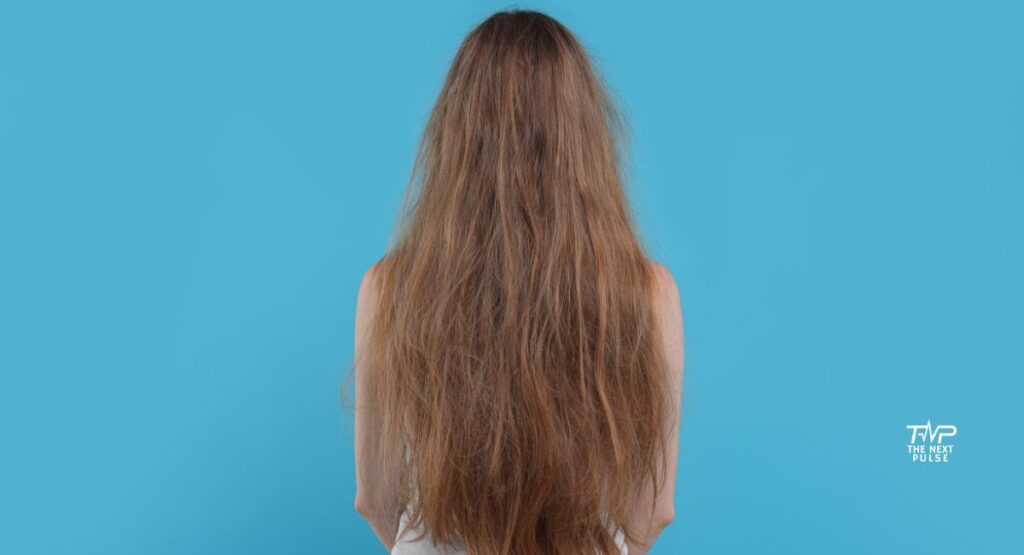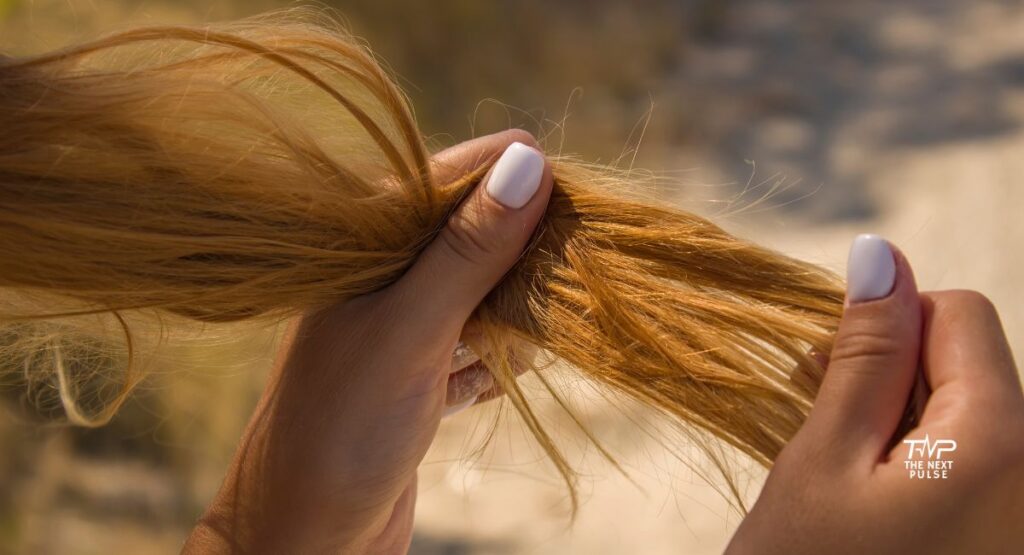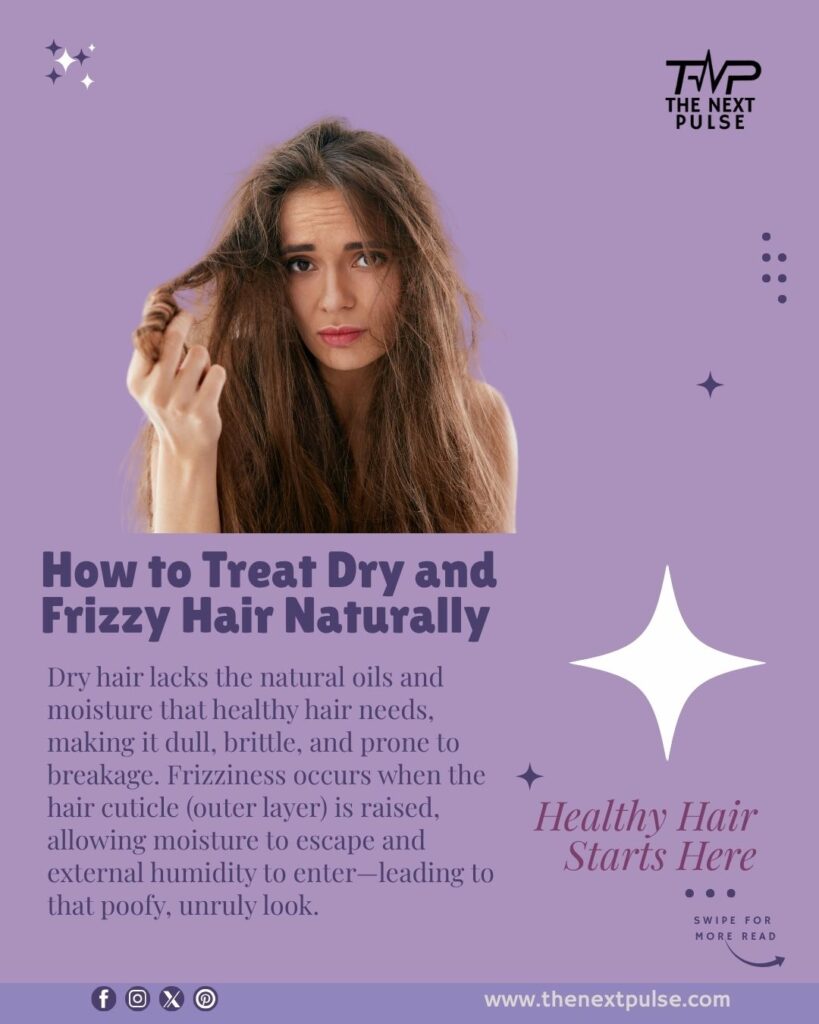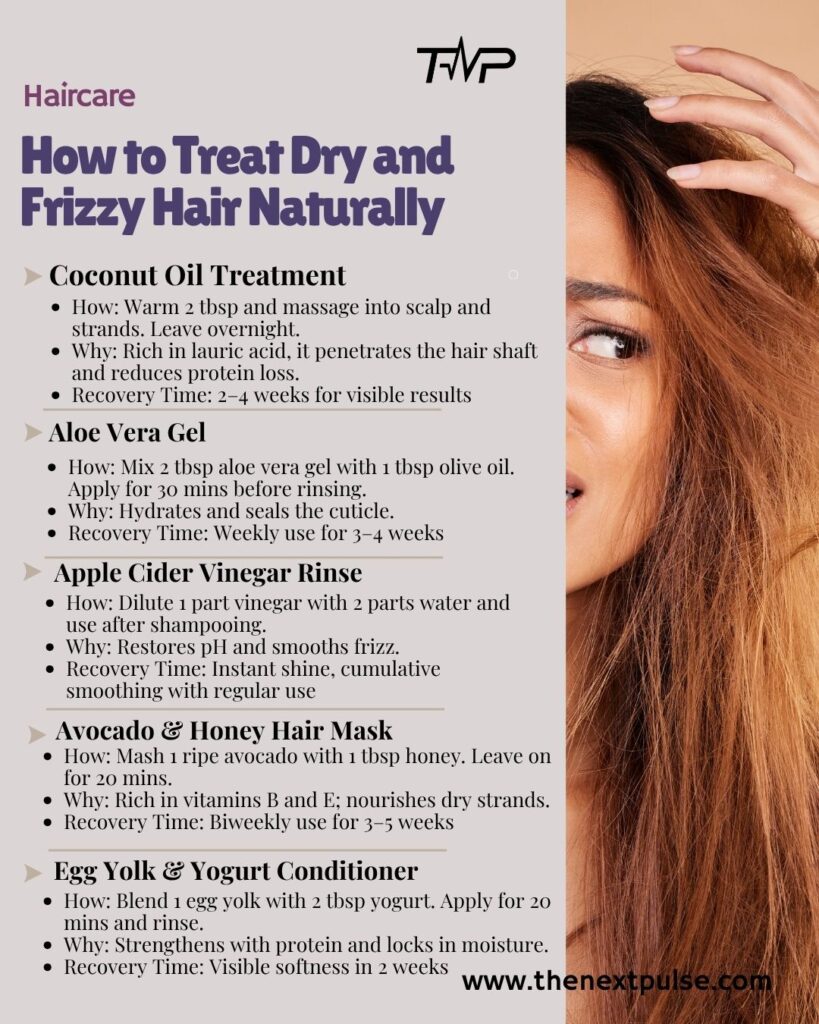Struggling with Unruly, Frizzy Hair? You’re Not Alone
Have you ever looked in the mirror and wondered why your hair feels like straw or balloons into a frizzy halo no matter what products you use? You’re not alone. Dry and frizzy hair affects millions globally—making styling a challenge and confidence a daily battle. If your scalp gets greasy fast but your ends stay dry, check out our dermatologist-backed guide on treating an oily scalp naturally.
Whether it’s due to weather, heat styling, or harsh shampoos, dry and frizzy hair can be a persistent struggle. But the good news? You can restore softness, shine, and smoothness with the right approach—without breaking the bank or damaging your strands further.
Why You’ll Love This Guide:
- Dermatologist-approved treatments that actually work
- Natural home remedies you can start tonight
- Long-term prevention strategies for lasting results
- Pro tips from clinical hair care experts
- Clear answers to your top hair care questions
Let’s dive into everything you need to know to transform brittle, frizzy hair into healthy, hydrated locks.

Understanding Dry and Frizzy Hair
What Is Dry and Frizzy Hair?
Dry hair lacks the natural oils and moisture that healthy hair needs, making it dull, brittle, and prone to breakage. Frizziness occurs when the hair cuticle (outer layer) is raised, allowing moisture to escape and external humidity to enter—leading to that poofy, unruly look.
How It Looks and Feels:
- Coarse or rough texture
- Lack of shine and manageability
- Tangled easily and breaks when brushed
- Flyaways and split ends
- Puffiness in humid conditions
Common Triggers and Causes:
- Over-washing with sulfate-based shampoos
- Heat styling (blow dryers, straighteners, curling irons)
- Chemical treatments (dyes, relaxers, perms)
- Sun and UV exposure
- Dry climates or winter air
- Poor diet lacking essential fats and vitamins
- Genetics—some hair types are naturally drier
- Cold water rinses can seal the hair cuticle — kind of like a mini cold plunge for your hair!

Medical Solutions: Dermatologist-Approved Treatments
If your hair’s condition is severe or long-standing, dermatological intervention can help. Here’s what the experts recommend:
1. Prescription-Strength Hydrating Shampoos
- What to use: Shampoos with ketoconazole, zinc pyrithione, or salicylic acid (if dandruff is involved).
- Why it helps: These cleanse without stripping moisture and help manage scalp conditions.
2. Deep Conditioning Treatments
- Products: Look for masks with ceramides, hyaluronic acid, and natural oils (argan, jojoba).
- Frequency: Once or twice weekly.
3. In-Clinic Hair Spa Treatments
- Examples: Keratin treatments, steam therapy, platelet-rich plasma (PRP).
- Results: Smoother, shinier hair after 1–3 sessions.
4. Supplements
- Biotin, omega-3s, and vitamin D improve hair health from within.
- Always consult your dermatologist before starting.
5. Scalp-Targeted Therapy
- If dryness starts from the scalp, dermatologists may recommend medicated oils or lotions with corticosteroids or antifungals.
Caution: Always perform a patch test before using new treatments. Consult a trichologist or dermatologist for chronic conditions like scalp psoriasis or alopecia.


Home Remedies for Dry and Frizzy Hair (Science-Backed & Safe)
1. Coconut Oil Treatment
- How: Warm 2 tbsp and massage into scalp and strands. Leave overnight.
- Why: Rich in lauric acid, it penetrates the hair shaft and reduces protein loss.
- Recovery Time: 2–4 weeks for visible results
Natural oils like argan and coconut oil are proven to hydrate and smooth frizzy strands. (Healthline)
2. Aloe Vera Gel Mask
- How: Mix 2 tbsp aloe vera gel with 1 tbsp olive oil. Apply for 30 mins before rinsing.
- Why: Hydrates and seals the cuticle.
- Recovery Time: Weekly use for 3–4 weeks
3. Apple Cider Vinegar Rinse
- How: Dilute 1 part vinegar with 2 parts water and use after shampooing.
- Why: Restores pH and smooths frizz.
- Recovery Time: Instant shine, cumulative smoothing with regular use
4. Avocado & Honey Hair Mask
- How: Mash 1 ripe avocado with 1 tbsp honey. Leave on for 20 mins.
- Why: Rich in vitamins B and E; nourishes dry strands.
- Recovery Time: Biweekly use for 3–5 weeks
5. Egg Yolk & Yogurt Conditioner
- How: Blend 1 egg yolk with 2 tbsp yogurt. Apply for 20 mins and rinse.
- Why: Strengthens with protein and locks in moisture.
- Recovery Time: Visible softness in 2 weeks
Expert Tips to Prevent Dryness & Frizz
1. Use a Sulfate-Free, Hydrating Shampoo: Switch to gentle, moisturizing formulas to retain natural oils.
2. Never Skip Conditioner: A silicone-free conditioner helps seal moisture and reduce friction.
3. Limit Heat Styling :Use heat tools no more than twice a week and always use a thermal protectant.
4. Switch to a Microfiber Towel: Regular towels cause friction—microfiber prevents breakage and reduces frizz.
5. Sleep on a Silk Pillowcase: It minimizes tangling and helps retain natural oils.
6. Healthy fats in your diet play a big role in hair shine. Try this avocado egg toast — it’s rich in protein and omega-3s.
💡 Pro Tip: “Treat your hair like delicate fabric. The less friction, heat, and harsh chemicals you use, the longer it will stay smooth and hydrated.” — Dr. N. Khan, Trichologist & Dermatologist
FAQs
1. Can stress cause dry and frizzy hair?
Yes. Chronic stress can disrupt hormone levels, leading to dry scalp and weakened hair strands.
2. How often should I wash dry hair?
Limit washing to 2–3 times a week. Over-washing strips natural oils.
3. Is frizzy hair the same as damaged hair?
Not always. Frizz can result from dryness, humidity, or genetics—not necessarily damage.
4. Do natural oils help control frizz?
Absolutely. Oils like argan, coconut, and almond coat the hair and lock in moisture.
5. When should I see a dermatologist?
If your dryness persists despite home care or you notice hair thinning or scalp flaking, it’s time to consult a professional.
Final Thoughts: Restore Your Hair’s Natural Glow—One Step at a Time
Dry and frizzy hair can be frustrating—but with a balanced routine of hydration, nourishment, and smart prevention, your hair can bounce back to its healthy, manageable self. Use dermatologist-backed treatments when needed, pair them with soothing natural remedies, and build gentle habits that support long-term hair health.
If you’ve tried everything and still struggle with dry, brittle hair, don’t hesitate to consult a dermatologist or trichologist. Personalized care may be the key to finally achieving the silky, frizz-free hair you deserve.
Dryness doesn’t just affect your hair — your skin can suffer too. Here’s how to treat dark, flaky skin effectively.

Argan Oil Hair
Lightweight Formula – Our argan oil for hair is an alcohol-free and fast-absorbing treatment that nourishes hair without leaving greasy residue, while also shielding hair from styling tools, chemical treatments, and environmental damage.
